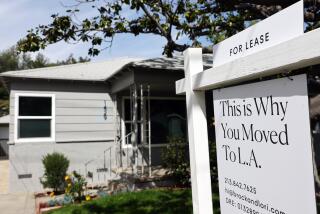Helping Hands
- Share via
Consider a homeless mother who flees an abusive husband and lives with her children in a shelter for battered women. She gets back on her feet and finally gets a job. She wants to move into her own place but it takes time to save enough for the first and last month’s rent.
That lump sum of up to $1,000 can be quite a barrier, but homeless families now can get help through a rental-assistance program created and coordinated by the United Way in Los Angeles and sections of San Bernardino and Kern counties. United Way, with federal help on funding and administrative help from the Travelers Aid Society, pays for the first month’s rent, money that does not have to be repaid. That way a family can move into an apartment with only the price of the last month’s rent.
Homeless families, disabled adults and elderly people qualify for the program. Participants are referred by 70 shelters and social-service agencies only if they have enough income to pay rent, have found a place and demonstrate that they are good candidates for the transition back into the mainstream. Nearly 550 families met the test in Southern California last year. Another 900 were helped under similar programs in Sacramento.
One part of the Sacramento program focuses on preventing homelessness by intervening to stop impending evictions. Families can qualify for an average of $300 a month toward rent, and at the same time undergo counseling that will help them stretch their dollars in the future. Some of the counseling is pretty basic. They learn, for example, that it is far less expensive to buy reuseable cloth diapers than to buy disposable diapers, which can run as much as $160 a month, and that they can still get their protein and save money at the same time by substituting bean dishes for meat now and then. The key lesson: The rent must come first.
Another phase of the program will take homeless families in and provide six weeks in an emergency shelter as a transition to an apartment. They, too, learn to stick to a strict budget, spending as little as $20-a-week for food and supplementing their meals with donated groceries. They also learn to save in a required savings account as a step toward moving into an apartment.
Families are a fast-growing segment of America’s homeless population. Once on the street, the route back to shelter is difficult even when a parent has a job. The United Way approach combining financial help with financial counseling is a model that other agencies would do well to follow.
More to Read
Sign up for Essential California
The most important California stories and recommendations in your inbox every morning.
You may occasionally receive promotional content from the Los Angeles Times.






